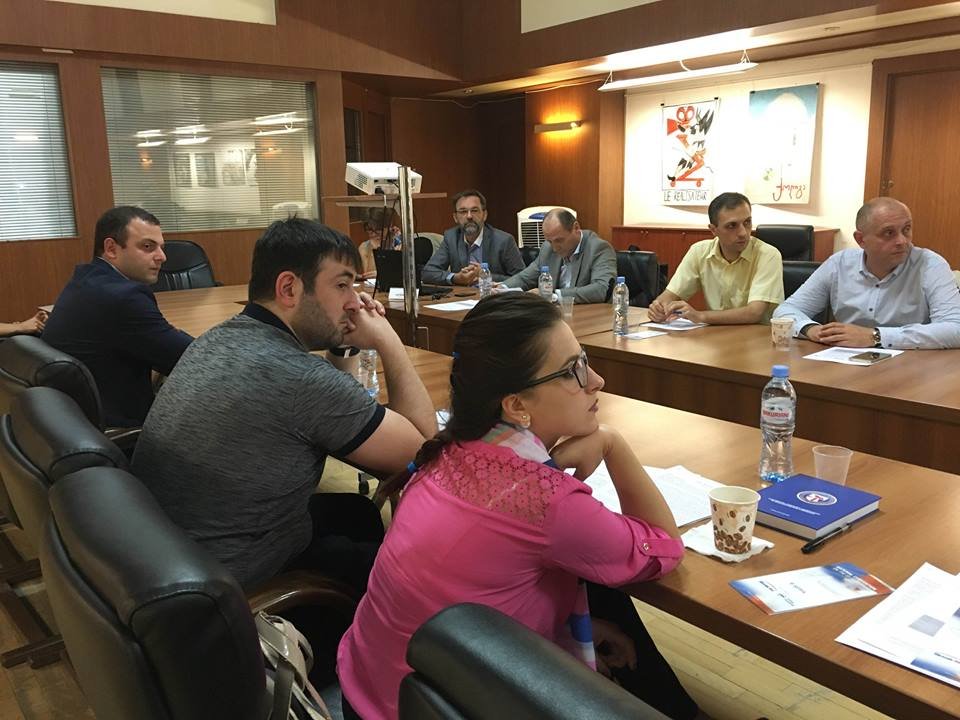On September 13, 2016 the Levan Mikeladze Foundation held the second meeting of Agriculture and Regional Development Working Group on the topic - “Development of Agricultural Extension System in Georgia”. The meeting was organized in the framework of the project - “National Convention on the EU in Georgia”. The project is carried out in partnership with the Slovak Foreign Policy Association (SFPA) and with the financial support of the Slovak Aid and Europe Foundation.
The meeting took place in the National Library of Georgia. It was chaired by Mr. Lasha Inauri, The Head of Euro Integration Department of the Ministry of Agriculture of Georgia and by Mr. Ilia Kvitaishvili, founder of Rural and Agricultural Policy and Development Institute.
The working group was composed with representatives of government bodies, NGOs, diplomatic missions of various states and the Delegation of the European Union. In total, there were 15 organizations represented in the session. These organizations were:
- Action Contre La Faim (ACF) Georgia
- Comprehensive Institutional Building Programme (CIB)
- Europe Foundation
- Europe for Georgia
- Georgian Farmers Association
- International Orthodox Christian Charities (IOCC)
- Mercy Corps
- Ministry of Economy and Sustainable Development
- Ministry of Environment and Natural Resource Protection
- Ministry of Regional Development and Infrastructure of Georgia
- Newspaper “Arguments and Facts”
- Slovak Foreign Policy Association (SFPA)
- The Information Center on NATO and the EU
- The Levan Mikeladze Foundation (LMF)
- The Ministry of Agriculture of Georgia (MOA)
During the Working Group meeting, two sets of recommendations, one drafted by Georgian expert Mr. Levan Dadiani and the second one prepared by Slovak expert, Mr. Jan Barsvary were presented and discussed.
Mr. Barsvary talked about the farm advisory system in Slovakia and its the legal framework in relation to the EU legislations. He further elaborated on the role of such advisors and their usage by local farmers. He emphasized on the passiveness of the Ministry of Agriculture SR in this area, particularly in the lack of incorporating the EU resources.
Mr. Dadiani discussed the relevance of the agricultural extension system in Georgia to the EU Association Agreement and the government strategy to the obligations set in the agreement.
The key findings and recommendations:
- The existing institutional structure for extension in Georgia at national, regional and district level can be seen as best practice, as many countries have established a similar structure;
- Although further review and evaluation is required periodically in order to be positioned up to date to the existing needs and demand. (The Strategy for Agricultural Development in Georgia for 2015-2020 Measure 3.2.1.);
- The following areas for review are recommended (EU): a. Assessment in each district of farmers’ needs for the provision of knowledge, information and advice in technical areas, as well as in farm management and economics, by the ICC; b. Assessment at the level of each region of the need among ICCs for the provision of support, knowledge and information by Regional ICCs3 and the National Scientific Research Institute; c. Assessment at national level of the need among Regional ICCs for the provision of support, knowledge and information by the RCD and the National Scientific Research Institute; d. Use of these assessments when further developing the institutional structure and the skills of the staff. EU Contract:2015/359312) Disbursement Memoir, 3rd tranche, June, 2015
- The strategy should also address the need to improve farmers’ business skills and enabling them to plan their business and investment as well as to develop the related record keeping, operational and management controlling systems.
- Find a solution on how the limited number of staff as well as facilities (e.g. transport) in the extension service can serve a large number of farmers (currently, each advisor has at least 2,500 farmers, i.e. a maximum of 3 minutes per farmer per month);
- Extension service is not an explicit duty of ICCs (!). It incorporates duties of the local agricultural statistics service, the function of liaising with locally existing agricultural cooperatives and with Agricultural Cooperatives’ Development Agency; such a multitask set up contains a risk of deficiency and overlapping that leads to the need of clear formalization of a division of ICC duties into data collection for the MoA, extension, cooperative promotion and other tasks. coordinated approach to rural development measures (inter-ministry/agency coordination);
- Extension of the activities of the “Farmer Boards” to include their involvement in the planning and prioritization of activities for the ICC;
- Systemic support for continuous exchange of experiences among ICCs (and Regional ICCs) in order to identify developed tools, approaches and methodologies;
- Strengthen cooperation with Agricultural Colleges, technical schools and other higher educational institutions for the coordination of i) farmer training; and ii) demonstration plots and the sharing of knowledge and information on farm management, technologies and specific advisory tools within the different areas.
- Planning of the production of knowledge at national level (with particular focus on the planning of demonstration plots and field trials at the National Scientific Research Centre, ICCs, Agricultural Colleges and other institutions), followed by the systematic collection of information for purposes of National Scientific Analysis.
- Conducting national inventory of the Demonstration Plots;
- Involvement of users in the production of materials for dissemination (e.g. the appointment of certain advisers and farmers for to working groups and advisory boards for the elaboration of leaflets and folders).
- Empowerment of staff at all levels of the institutional structure (ICC advisors and management, Regional ICC staff and experts at national level). This has already been included in the Strategy for Agricultural Development in Georgia 2015-2020 in Measure 3.2.1. The EU specifically proposes that the MoA focus on:
- Support to the provision of successful advice to farmers on production technology as well as developing skills of the advisory service in Farm Management practices and tools;
- Support the Heads of the ICCs and Regional ICCs through developing their managerial skills (includes staff management, activity planning, resource management etc.).
